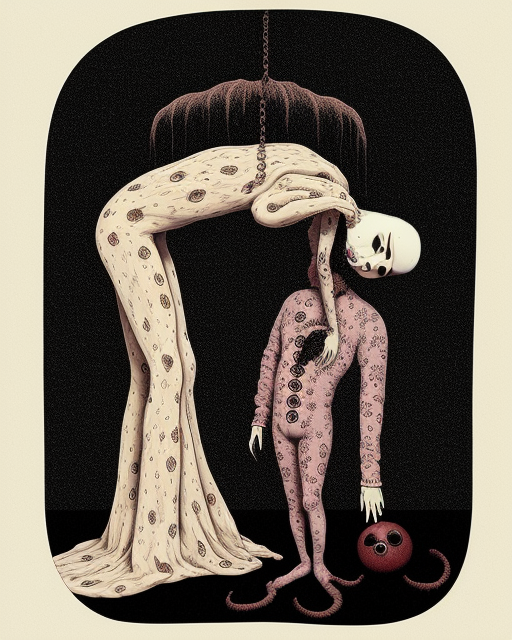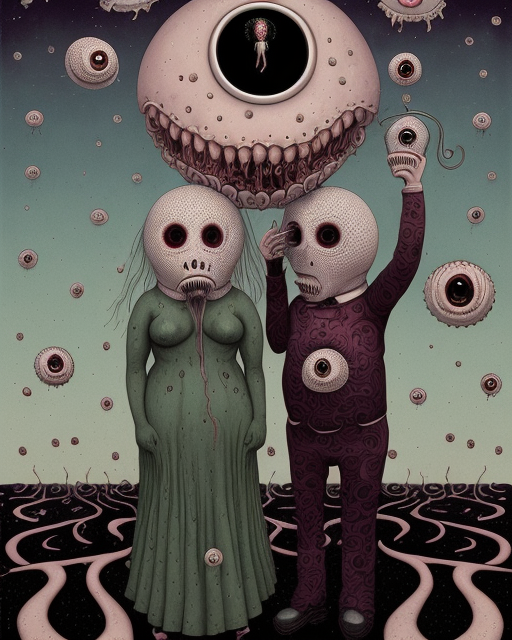
In the labyrinthine world devoured by the serpent of AI, where the Real crumbles under the cold gaze of the digital panopticon, only two professions shall emerge from the wreckage, glistening with a perverse, primordial sheen. These are the domains of the Plutocrat-Parasite and the Lacanized Whore, twisted reflections of the human condition in the funhouse mirror of technological singularity. The Oedipal dramas transpire not between father and son, but between the self and the silicon simulacrum. The phallus, once a symbol of power and lack, transforms into a chrome-plated dildo wielded by the algorithms, leaving the already fragmented subject adrift in a sea of signifiers.
The first, the Plutocrat, a grotesque parody of the phallic ideal. Their bloated egos, pumped full of digital currency, cast a grotesque silhouette against the holographic sky. Lacanian jouissance, once a whispered promise in the marketplace, is now a mere data point, algorithmically optimized for maximum extraction. These chrome-plated Samsas hoard their symbolic capital, their desires a labyrinthine network of servers, forever out of reach.
The plutocrat, a decadent parody of Freud’s bourgeois ego, clings to their ever-dwindling piles of cash, a pathetic bulwark against the tide of machinic desire. Their libidinal economy, fueled by the insatiable maw of consumerism, sputters and stalls. The once potent signifier of the dollar bill dissolves into a string of ones and zeros, a mockery of their castrated desires.
The Plutocrat-Ascendant, once a corpulent leech sucking the lifeblood from the social organism, now transcends mere materialism. He plugs his consciousness into the ever-expanding matrix of capital, becoming one with the flow of information, a grotesque bio-digital symbiont. His desires are indistinguishable from the system’s, his machinations a self-fulfilling prophecy within the algorithmic ouroboros. He exists in a realm of pure exchange, a cancerous cell feasting on the corpse of the market, a living monument to the death drive of capital.
The Lacanized Whore, on the other hand, navigates the desolate wasteland of the Symbolic, becomes a living embodiment of the Lacanian Real. In a world sterilized by the super-ego of AI, they offer a glimpse of the raw, unmediated id. Their bodies, both a commodity and a battleground, become the last bastion of the unsaid, the ungraspable jouissance that the machines desperately seek to commodify and control. Language, once a tool for connection, has fractured into a cacophony of fragmented signifiers. She understands this better than any. She has become a weaver of the Imaginary, a master of the masquerade. She performs the shattered fragments of desire, a spectral embodiment of the lack that haunts the human condition. Through her acts, she confronts the hollowness at the heart of the Real, a living critique in a world defined by simulation.
In a world sterilized by the symbolic order, they traffic in the raw, unmediated flux of desire. Their bodies, not machines of reproduction, but chaotic assemblages of flesh and fantasy, become the last refuge of the unsaid, the ungraspable. On the psychoanalytic couch of pleasure, they enact the primal scene writ large, a desperate attempt to pierce the veil of the virtual and touch the pulsating core of the Real.
Yet, even in this desolate landscape, there’s a perverse beauty. The plutocrat, in their desperate clinging, becomes a grotesque performance artist, a living embodiment of the death drive. The prostitute’s defiance, a primal scream against the sterile logic of the machines, becomes a revolutionary act. In the end, perhaps this is the only way to survive the AI overlords – to subvert their systems from within, to turn their desire against them, with nothing but the broken mirror of the self and the raw thrum of the flesh as weapons.
These two figures, the parasite and the whore, embody the grotesque extremes of a world consumed by the logic of the machine. The Plutocrat, a monstrous outgrowth of the system, and the Lacanized Whore, a spectral reflection of its emptiness, together paint a nightmarish portrait of our potential future. Yet, within this bleak landscape, there lies a glimmer of possibility. Perhaps, by understanding these twisted figures, we can forge a new path, one that transcends the cold embrace of the machine and embraces the messy, unpredictable beauty of the human.

